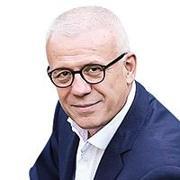My suggestion about electing a Kurd as president in Turkey is not so original
Paylaş
My aim was to "be provocative". Therefore I ask the same question again, provocatively and directly: "Would you vote to elect a Kurd to president?"
Before yesterday’s column was even published, the first reaction came from Vahap Munyar, the economy chief of Hurriyet daily.
"Mr. Ertugrul, don't forget Turkey has elected a Kurdish origin president in the past. Don't forget Turgut Ozal," he said.�
No, I have not forgotten him.
But, Ozal was only half Kurdish.
In the morning Tansu* opened the same subject to discussion while I was having my coffee, saying:
"Of course I would vote for a Kurd. Not a person like the leader of the Democratic Society Party, but someone like Ozal. His being a Kurd or Turk is not important. Why I wouldn’t I vote for someone in Turkey with a similar character to Barack Obama."
I was met by similar reactions throughout the day.
Most said it was not important whether the person they voted for was a Turk, Kurd, Laz, Circassian or Arab.
Most said:
"His or her character is what is important."
I thought I had stumbled across an original idea when writing my column yesterday.
But it seems that I had touched on an issue being discussed around the world, whether in hushed whispers or in loud debate.
I noticed when I checked the news agencies that the main discussions surrounding the elections focused on selection of "the other to the presidency" or on the rise to a powerful position, the likes of which we have not seen before.�
This is why we covered this issue in the Hurriyet daily’s headline news:
"Everyone searches for their own Obama"
* * *
In fact, this is not really the case.
This situation should not be referred to as an "American revolution" but the "Other's revolution".
Societies are discussing the "other" inside them.
A "negro" there, a "Turk" in Germany, a "Kurd" in Turkey and a black pope in the Vatican.
People are pushing the limits of their paradigms.
Then who won in the United States?
Can we say the "negro" identity, the less politically correct way of saying "African American?"
Obama never referred to belonging to a particular race or having a particular ethnic identity during his campaigning or in his victory speech.
He said "one nation, one country, one people".
* * *
Who is Barack Obama?
Is he white or black?
In fact, he is neither one nor the other.
His father was a black immigrant from Africa and his mother is a white American.
So, why do we see him as a "black" person?
The answer is very simple.
The color of his skin.
This color imposes an identity, no matter how much you try to deny it.
He writes some very interesting things at the very beginning of his book, “Dreams from my father”, in which he tells of the story of his life.
He writes that he used to hide the fact that his mother was a white when he met new people.
Under most conditions, wouldn’t someone say something about themselves that would help to make it easier for them progress through society?
Obama answers "no" to this question and explains this situation as this:
"I refrained from doing this when I was about twelve or thirteen. I thought that people would think I was trying to make myself more sympathetic for white people."
This man, who concealed his white origins, never spoke about being black or white during the presidential campaign.
* * *
As a result I can say that Obama's election victory has not been a victory for politics based on "ethnic identity" or "racism", despite its "defeat".
Obama can bring this win to its final conclusion and be successful in governing and prove this "defeat".
Only at that time would we will be able to see the end of politics based solely on ethnic identity, a headscarf, a religious school, or simply primitive nationalism. Only then will we be able to see the ugliness of unplanned cities, the garbage, the sewerage flowing into the streets and the disruption to the flow of city water, in the ruins of this politics.
All this will become very clear and we will elect someone who can solve these problems regardless of whether they are a Turk, a Kurd, Laz, black or white.
The defeat of ethnic identiy and religion based politics will be the true people’s revolution of 20th Century.
* Wife of Ertugrul Ozkok
Paylaş








